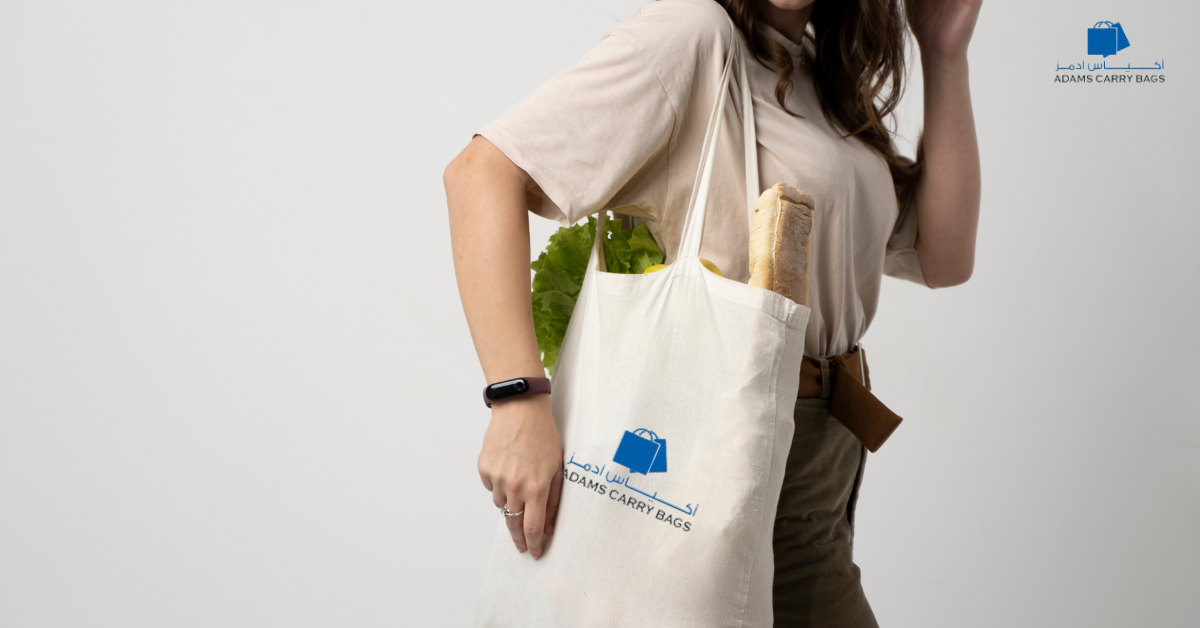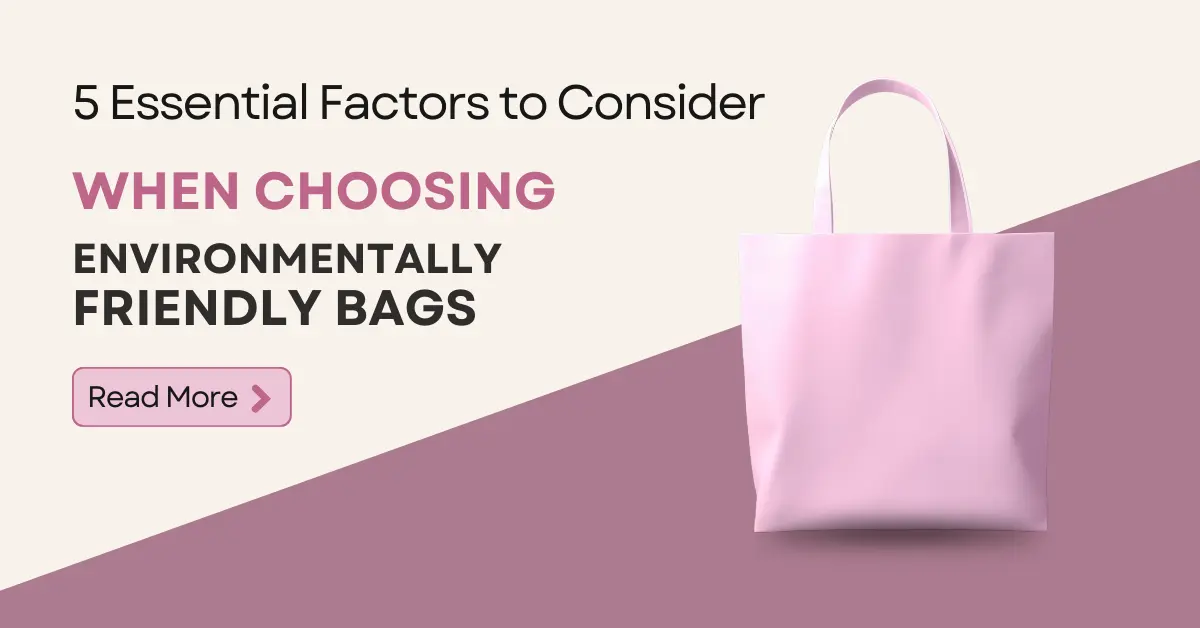When it comes to grocery shopping, the choice of bag you use can make a significant impact on the environment. In this guide, we’ll explore expert tips for selecting the perfect grocery bag that aligns with sustainability goals. From reusable to non-woven carry bags, we’ll cover all the options to help you make an eco-friendly choice.

Understand Your Needs For Grocery Bag
Before choosing a grocery bag, assess your shopping habits and needs. Consider factors such as the size of your grocery haul, the distance you need to carry the bags, and any specific features you require, such as insulation for perishable items.
Understanding your needs is the first step towards choosing the perfect grocery bag for your shopping endeavors. It involves a thoughtful assessment of various factors to ensure that the bag you select aligns with your lifestyle, preferences, and sustainability goals. Consider the size of your typical grocery haul and the frequency of your shopping trips. If you tend to buy a lot of groceries at once or make frequent trips to the store, you’ll need a bag that can accommodate a larger volume of items without compromising comfort or convenience.
Additionally, think about the distance you’ll need to carry the bag from the store to your home. If you live within walking distance or often take public transportation, you’ll want a bag that is sturdy and comfortable to carry for extended periods. On the other hand, if you typically drive to the store and can easily transport groceries in your vehicle, you may prioritize other features such as durability or eco-friendliness.
Understanding your needs also involves considering any specific requirements or preferences you have for a grocery bag. Whether it’s insulation for keeping perishable items fresh, extra pockets for organizing smaller items, or a particular material preference for environmental reasons, taking these factors into account will help you make an informed decision when selecting the perfect grocery bag.
Opt for Reusability
Investing in reusable grocery bags is a sustainable choice that reduces the need for single-use plastic bags. Look for durable, high-quality bags made from eco-friendly materials like cotton, canvas, or recycled plastics. These bags are not only better for the environment but also more cost-effective in the long run.
Opting for reusability when choosing a grocery bag is a sustainable and environmentally conscious decision that can have a significant impact on reducing plastic waste and promoting a greener lifestyle. Reusable grocery bags are designed to withstand multiple uses, making them a durable and long-lasting alternative to single-use plastic bags. By investing in reusable bags, you not only minimize your reliance on disposable plastic but also contribute to conserving natural resources and reducing carbon emissions associated with the production and disposal of plastic bags.
Reusable grocery bags come in various sizes, styles, and materials, allowing you to choose the option that best suits your needs and preferences. Whether you prefer canvas, cotton, or recycled materials, there is a reusable bag available to meet your requirements. Additionally, many reusable bags are designed with reinforced stitching and sturdy handles to ensure they can withstand the weight of heavy groceries without tearing or breaking.
Choosing reusable grocery bags also offers economic benefits, as they often come with incentives such as discounts or promotions when used at participating stores. By incorporating reusable bags into your shopping routine, you can save money over time while also reducing your environmental footprint and contributing to a healthier planet for future generations.
Consider Non-Woven Carry Bags
Non-woven carry bags are another eco-friendly option for grocery shopping. These bags are made from synthetic fibers bonded together, offering durability and strength while being lightweight. They are also reusable and recyclable, making them a sustainable choice for environmentally conscious shoppers.
Consideration of non-woven carry bags presents a compelling option for eco-conscious shoppers seeking sustainable alternatives to traditional plastic bags. These bags are crafted from synthetic fibers that are bonded together, offering a durable and sturdy solution for carrying groceries and other items. Unlike single-use plastic bags, non-woven carry bags can be reused multiple times, reducing waste and minimizing environmental impact.
Non-woven carry bags are lightweight yet strong, making them ideal for transporting heavy loads without compromising on durability. Additionally, they are resistant to tearing and water, providing added protection for your groceries during transit. Their versatility makes them suitable for a wide range of applications beyond grocery shopping, such as carrying books, clothing, or household essentials.
One of the key advantages of non-woven carry bags is their eco-friendliness. These bags are recyclable and can be easily repurposed or disposed of responsibly at the end of their lifespan. By choosing non-woven carry bags over single-use plastic bags, consumers can play a significant role in reducing plastic pollution and promoting sustainability.
Furthermore, non-woven carry bags are available in a variety of colors, sizes, and designs, allowing shoppers to express their personal style while making environmentally conscious choices. Whether you’re running errands or stocking up on groceries, non-woven carry bags offer a practical and environmentally friendly solution for transporting your belongings.
Prioritize Eco-Friendly Materials
When selecting a grocery bag, it’s crucial to prioritize eco-friendly materials to minimize environmental impact and promote sustainability. Opting for bags made from eco-friendly materials such as organic cotton, recycled plastics, or natural fibers like jute or hemp can significantly reduce your carbon footprint and help mitigate plastic pollution.
Eco-friendly materials are sourced and manufactured in a manner that minimizes harm to the environment, such as using renewable resources, reducing energy consumption, and minimizing waste during production. By prioritizing these materials, consumers can support sustainable practices and contribute to a healthier planet.
Bags made from eco-friendly materials are not only better for the environment but also safer for human health. They are often free from harmful chemicals and toxins commonly found in conventional plastics, reducing the risk of exposure to harmful substances.
Additionally, eco-friendly materials are often biodegradable or recyclable, allowing for responsible disposal at the end of their lifespan. This reduces the burden on landfills and promotes the circular economy by facilitating the reuse and recycling of materials.
By prioritizing eco-friendly materials when choosing a grocery bag, consumers can make a positive impact on the environment and support the transition towards a more sustainable and regenerative economy.
Look for Innovation and High Quality
When searching for the perfect grocery bag, it’s essential to prioritize innovation and high quality to ensure you’re investing in a product that meets your needs and stands the test of time. Innovative features and high-quality construction can enhance the functionality, durability, and sustainability of the bag, providing added value for consumers.
Innovative grocery bags may incorporate advanced materials, such as recycled plastics or biodegradable fibers, to reduce environmental impact and promote sustainability. They may also feature ergonomic designs, such as padded handles or adjustable straps, to enhance comfort and ease of use during transportation. Additionally, innovative bags may include special compartments or organizational features to help users streamline their shopping experience and keep items organized.
High-quality construction is essential for ensuring the longevity and durability of a grocery bag. Look for bags with reinforced stitching, sturdy handles, and durable materials that can withstand the rigors of daily use. High-quality bags are less likely to tear or break, reducing the need for frequent replacements and minimizing waste.
By prioritizing innovation and high quality when selecting a grocery bag, consumers can invest in a product that not only meets their immediate needs but also contributes to a more sustainable and environmentally friendly shopping experience.
Choosing the perfect grocery bag is essential for sustainable shopping practices. By following these expert tips and considering options like reusable bags, non-woven carry bags, and eco-friendly materials, you can make an environmentally conscious choice that reduces waste and protects the planet. Start implementing these tips today to make a positive impact every time you shop for groceries.





